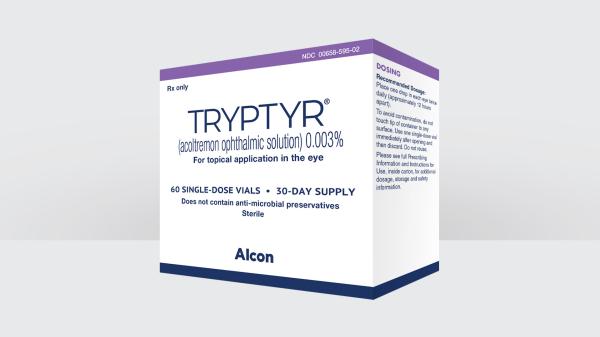Acoltremon (Monograph)
Brand name: Tryptyr
Drug class: EENT Drugs, Miscellaneous
Introduction
Acoltremon is a transient receptor potential melastatin 8 (TRPM8) thermoreceptor agonist.
Uses for Acoltremon
Acoltremon has the following uses:
Acoltremon ophthalmic solution is indicated for the treatment of the signs and symptoms of dry eye disease.
Acoltremon Dosage and Administration
General
Acoltremon is available in the following dosage form(s) and strength(s):
Ophthalmic solution containing 0.003% acoltremon in a single-dose vial.
Dosage
It is essential that the manufacturer's labeling be consulted for more detailed information on dosage and administration of this drug. Dosage summary:
Adults
Dosage and Administration
For topical application in the eye.
Instill one drop in each eye twice daily (approximately 12 hours apart).
See Full Prescribing Information for additional instructions on administration.
Cautions for Acoltremon
Contraindications
None.
Warnings/Precautions
Potential for Eye Injury and Contamination
To avoid the potential for eye injury and contamination, do not touch the vial tip to the eye or other surfaces.
Use with Contact Lenses
Acoltremon should not be administered while wearing contact lenses. If contact lenses are worn, they should be removed prior to administration of the solution. Lenses may be reinserted 15 minutes following administration of acoltremon.
Specific Populations
Pregnancy
There are no adequate and well-controlled studies on acoltremon in pregnant women. Systemic exposure to acoltremon from ocular administration is negligible. Intravenous administration of acoltremon to pregnant rats and rabbits during organogenesis did not produce embryofetal toxicity at 806- and 2151-fold the maximum recommended human ocular dose (MRHOD) of acoltremon on a mg/m2 basis.
All pregnancies have a risk of birth defect, loss, or other adverse outcomes. In the US general population, the estimated background risk of major birth defects is 2 to 4%, and of miscarriage is 15 to 20%, of clinically recognized pregnancies.
Lactation
There are no data on the presence of acoltremon in human milk, the effects on the breastfed infant, or the effects on milk production. However, systemic exposure to acoltremon following topical ocular administration is low. The lack of clinical data during lactation precludes a clear determination of the risk of acoltremon to an infant during lactation; however, the developmental and health benefits of breastfeeding should be considered along with the mother’s clinical need for acoltremon.
Pediatric Use
The safety and effectiveness of acoltremon have not been established in pediatric patients.
Geriatric Use
No clinically relevant differences in safety have been observed between elderly and younger patients.
Common Adverse Effects
The most common adverse reaction was instillation site pain (50%).
Drug Interactions
Specific Drugs
It is essential that the manufacturer's labeling be consulted for more detailed information on interactions with this drug, including possible dosage adjustments. Interaction highlights:
Please see product labeling for drug interaction information.
Actions
Mechanism of Action
Studies in animals suggest that acoltremon is an agonist of transient receptor potential melastatin 8 (TRPM8) thermoreceptors. TRPM8 thermoreceptor stimulation has been shown to activate trigeminal nerve signaling leading to increased basal tear production. The exact mechanism of action for acoltremon in dry eye disease is unknown.
Advice to Patients
-
Advise patients to read the FDA-approved patient labeling (Instructions for Use).
-
Advise patients not to touch the tip of the single-dose vial to their eye or to any surface in order to avoid eye injury or contamination of the solution.
-
Advise patients that one single-dose vial can be used to dose both eyes immediately after opening. Discard the single-dose vial, including any remaining contents, after use.
-
Advise patients that contact lenses should be removed prior to administration of acoltremon and can be reinserted 15 minutes after administration.
-
Advise patients that if more than one topical ophthalmic drug is being used, the drugs should be administered at least five (5) minutes apart.
-
Instruct patients to store unopened single-dose vials in the original foil pouch until ready to use.
Additional Information
AHFSfirstRelease™. For additional information until a more detailed monograph is developed and published, the manufacturer's labeling should be consulted. It is essential that the manufacturer's labeling be consulted for more detailed information on usual uses, dosage and administration, cautions, precautions, contraindications, potential drug interactions, laboratory test interferences, and acute toxicity.
Preparations
Excipients in commercially available drug preparations may have clinically important effects in some individuals; consult specific product labeling for details.
Please refer to the ASHP Drug Shortages Resource Center for information on shortages of one or more of these preparations.
|
Routes |
Dosage Forms |
Strengths |
Brand Names |
Manufacturer |
|---|---|---|---|---|
|
Ophthalmic |
Solution |
0.003% |
Tryptyr |
Alcon Laboratories |
AHFS DI Essentials™. © Copyright 2025, Selected Revisions July 10, 2025. American Society of Health-System Pharmacists, Inc., 4500 East-West Highway, Suite 900, Bethesda, Maryland 20814.
Reload page with references included
Related/similar drugs
More about acoltremon ophthalmic
- Compare alternatives
- Side effects
- Dosage information
- During pregnancy
- Drug class: miscellaneous ophthalmic agents
- En español

